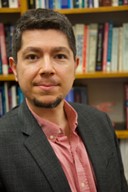 Onur Apul is an assistant professor of environmental engineering at the University of Maine. He earned his Ph.D. in 2014 in Environmental Engineering at Clemson University and his M.S. in 2009 from Turkey’s Middle East Technical University. Dr. Apul is selected to the 2022 cohort of the American Academy of Environmental Engineers and Scientists, 40 Under 40 Recognition Program. In 2021, he received the Emerging Investigator Award by Sustainable Nanotechnology Organization. In 2019, he received the “Outstanding Teacher Award” from American Society of Civil Engineers (ASCE) – Student Chapter. Dr. Apul has published more than 65 peer-reviewed journal articles and submitted 6 patent applications to date. He has given more than 100 presentations including invited keynote lectures and invited talks at national and international meetings. He is an editor of Chemical Engineering Science and early career editorial board member of Chemical Engineering Journal Advances and a member of American Chemical Society, Sustainable Nanotechnology Organization, and the Association of Environmental Engineering and Science Professors.
Onur Apul is an assistant professor of environmental engineering at the University of Maine. He earned his Ph.D. in 2014 in Environmental Engineering at Clemson University and his M.S. in 2009 from Turkey’s Middle East Technical University. Dr. Apul is selected to the 2022 cohort of the American Academy of Environmental Engineers and Scientists, 40 Under 40 Recognition Program. In 2021, he received the Emerging Investigator Award by Sustainable Nanotechnology Organization. In 2019, he received the “Outstanding Teacher Award” from American Society of Civil Engineers (ASCE) – Student Chapter. Dr. Apul has published more than 65 peer-reviewed journal articles and submitted 6 patent applications to date. He has given more than 100 presentations including invited keynote lectures and invited talks at national and international meetings. He is an editor of Chemical Engineering Science and early career editorial board member of Chemical Engineering Journal Advances and a member of American Chemical Society, Sustainable Nanotechnology Organization, and the Association of Environmental Engineering and Science Professors.
Read Onur’s Emerging Investigator article “Microplastic-based Leachate Formation under UV Irradiation: The Extent, Characteristics, and Mechanisms” and read more about him in the interview below:
Your recent Emerging Investigator Series paper focuses on Microplastic-based Leachate Formation under UV Irradiation: The Extent, Characteristics, and Mechanisms. How has your research evolved from your first article to this most recent article?
My PhD research focused on delineating intermolecular interactions for adsorption of organic pollutants by carbon-based materials. My training in adsorption of synthetic organic compounds inspired me to study microplastic surfaces as a new domain in aquatic environments. In the lab, we were getting familiar with microplastics, and our collaborator and EPA researcher Dr. Ateia helped us realize the importance of release of dissolved organic matter from microplastics. Overall, this study is a product of another type of interfacial interaction which gradually evolved from my PhD work.
What aspect of your work are you most excited about at the moment?
This study is only a first step of understanding interfacial interactions of microplastics in natural waters. There are other exciting and relevant research questions that we are asking to reveal this mechanism further. But personally, the ability to raise awareness and eventually mitigate this potential water quality problem, which is only recently connected to the life-cycle of plastics, excites me the most.
In your opinion, what are the most important questions to be asked/answered in this field of research?
New and advanced plastics and composites are breaking through in research and development. There are claims regarding their biodegradability, UV resistance, thermal resistance, self-healing properties. But how do these exciting material properties change the way these microplastics leach dissolved organic matter? And do we have the means to manage this additional influx of organic matter in water treatment facilities especially if you consider microplastics as widespread, increasing, non-point sources of pollution.
What do you find most challenging about your research?
Balancing the complexity of actual systems and the simplicity that we need in the lab to reveal fundamental information is the most challenging part of this research. In the environment there are so many types of plastics, different shapes, sizes, water quality metrics, biofilm coverage of these materials, mechanical interactions, diurnal variations, temperature changes. However, in the lab we are using distilled water and perfectly spherical, 3 mm beads in idealized conditions to understand very specific mechanisms. Although we learn transformative and new knowledge in simple systems, the differences between real world conditions start to make our research context disconnected. For engineers, I believe this delicate balance is universal and always challenging.
In which upcoming conferences or events may our readers meet you?
I try to attend Association of Environmental Engineering and Science Professors (AEESP) Research and Education Conferences, Sustainable Nanotechnology Organization (SNO) Conferences, American Chemical Society (ACS) Conferences, Water Quality and Technology Conference, (WQTC), Gordon Research Conferences (GRC).
How do you spend your spare time?
I try to read, listen to music, ride my bicycle, play basketball and exercise. But I am not doing a good job in balancing my time between work and play.
Which profession would you choose if you were not a scientist?
I would choose to be a lawyer. Probably because I don’t know how hard it is to be one.
Can you share one piece of career-related advice or wisdom with other early career scientists?
I would suggest learning how to manage time early on, which means learning how to say “no” to some opportunities. This would allow focusing on your research and advance more in one area. Also be kind to yourself. You are doing good!










